ARRESTS.ORG SC – SEARCH SOUTH CAROLINA ARRESTS RECORDS
Arrests.org SC offers an invaluable resource for individuals seeking information on arrest records within South Carolina. This platform aggregates publicly available data to provide insight into recent arrests across the state. Users can access a comprehensive database that includes details such as arrest dates, charges filed, and the arresting agency. By compiling this information in one accessible location, Arrests.org SC aims to promote transparency and awareness regarding law enforcement activities in South Carolina.
Understanding the importance of public access to legal records, Arrests.org SC serves as a bridge between citizens and the information they seek. This resource facilitates a clearer understanding of arrest trends and patterns within various counties of South Carolina. Whether for personal knowledge or research purposes, the platform provides a straightforward interface to explore recent arrest incidents without the need for specialized tools or subscriptions.
Overview of South Carolina Arrest Records
In today’s digital age, accessing public records has become increasingly convenient, and one such resource is the South Carolina Arrest Records search tool. This online tool provides users with the ability to look up arrest records within the state of South Carolina, leveraging data sourced from the South Carolina Law Enforcement Division (SLED). While the tool itself is hosted by a third-party company, it’s important to note that it operates independently and is not affiliated with any government agency.
Using the South Carolina Arrest Records Search Tool
You can access the tool through the website: https://southcarolina.recordspage.org/arrest-criminal-records/
To use the tool, you will need to provide the following information:
- First Name: Enter the first name of the person you are searching for.
- Last Name: Enter the last name of the person you are searching for.
- City (Optional): Enter the city where the person you are searching for may have been arrested.
- State: Select the state of South Carolina.
- County (Optional): Enter the county where the person you are searching for may have been arrested.
Once you have entered all of the required information, click on the “SEARCH” button. The tool will then search its database for matching arrest records.
Understanding Search Results
If the tool finds any matching arrest records, they will be displayed on a new page. Each arrest record will include information such as:
- Name: The name of the person who was arrested.
- Date of Arrest: The date the person was arrested.
- Charge: The charge(s) for which the person was arrested.
- Agency: The law enforcement agency that made the arrest.
- Case Number: The case number for the arrest.
Limitations to Consider
Despite its utility, it’s crucial to acknowledge the limitations of the South Carolina Arrest Records search tool. Not all arrest records may be included in the database, particularly those that are sealed or expunged from public records. Moreover, the tool may not always provide comprehensive details about an arrest, thus requiring users to exercise caution and perhaps corroborate findings through official channels for critical matters.
Utilizing the Tool Effectively
While the South Carolina Arrest Records search tool serves various purposes, it is especially valuable for preliminary research. For instance, individuals and businesses might use it for background checks on potential employees or tenants, although it’s advisable to supplement this information with other forms of verification due to the tool’s inherent limitations. Genealogists exploring family histories or journalists researching crime-related stories may also find it beneficial, provided they verify the data through official sources for accuracy and completeness.
Accessing South Carolina Arrest Records
Due to federal and state laws, most arrest records in South Carolina are available to the public. However, locating them can be challenging without proper guidance.
South Carolina offers some easy ways to find someone’s arrest record. Various government agencies (both state and local) provide online search databases to help individuals find arrest records in South Carolina.
If you’re looking to check if someone is in jail, this guide will show you how to use these search tools to find recent arrests, charges, and their current status. You can also contact these state and local agencies directly by phone or in person if needed.
The South Carolina government maintains a public repository of detailed arrest records due to federal and state FOIA laws. However, there are certain exemptions on what information can be released, especially if it may impact ongoing investigations or an individual’s rights, such as the right to a fair trial. Federal and South Carolina laws have similar rules for these exemptions.
Note that arrest and criminal records are kept by different authorities and require different processes to access. To obtain arrest records, you need to search through law enforcement agencies.
How to Find Arrest Records in South Carolina
South Carolina offers a couple of straightforward methods to search for recent arrest records for free.
The search process depends on which agency made the arrest (e.g., police department) and where the person is held (e.g., county jail, state prison, etc.). Start by collecting information about the person you are searching for.
The more details you have, the higher your chances of finding accurate records.
To locate why someone was arrested, their first and last name (unless it is a very common name) should be sufficient to find South Carolina arrest records.
Even without a name, you might still find the necessary information.
Some search engines allow you to enter other descriptive details during your search. Many local agencies provide a jail roster that you can search manually. While this may be time-consuming, it offers a thorough search for an individual’s arrest record.
If you cannot find the arrest record online with the information you have, the law enforcement agency or jail should have a procedure for providing an arrest record.
Access South Carolina Arrest Records via SCDOC
The South Carolina Department of Corrections (SCDOC) offers a public database to access arrest records for current inmates.
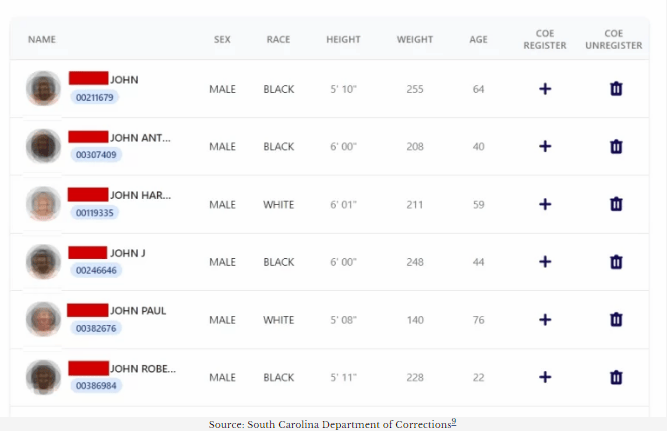
Use their search tool by entering a person’s name, South Carolina Department of Corrections ID, or State Identification Number. The tool also offers a phonetic match search option.
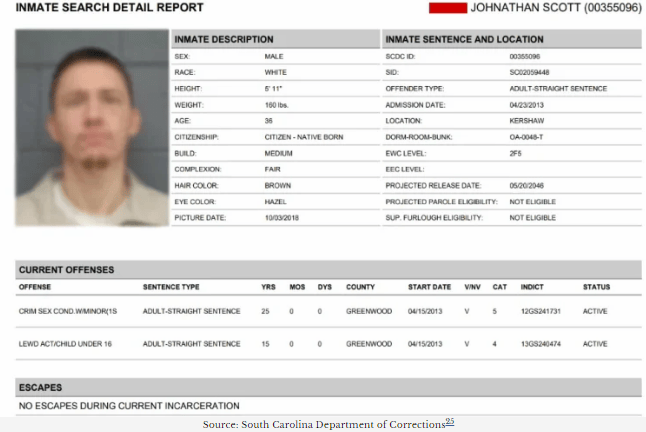
This tool from South Carolina’s Department of Corrections offers the following details about individuals under arrest:
| Field | Detail |
|---|---|
| Name | John Doe |
| Gender | Male |
| Age | 35 |
| Date of Birth | 1988-01-15 |
| Citizenship | USA |
| Race | White |
| Height | 6’1″ |
| Hair Color | Brown |
| Weight | 180 lbs |
| Eye Color | Blue |
| Admission Date to Institution | 2020-05-10 |
| Expected Release Date | 2025-05-10 |
| State ID Number | 123456 |
| Disciplinary Actions | None |
| Status | Incarcerated |
| Current and Previous Incarceration Locations | State Prison A, State Prison B |
| Current Offenses | Theft (Felony), 5 years, County A, 2020-04-01, 7891011, Active |
Obtaining Arrest Records in South Carolina
In South Carolina, you have the option to request an arrest history record check from the South Carolina Law Enforcement Division (SLED).
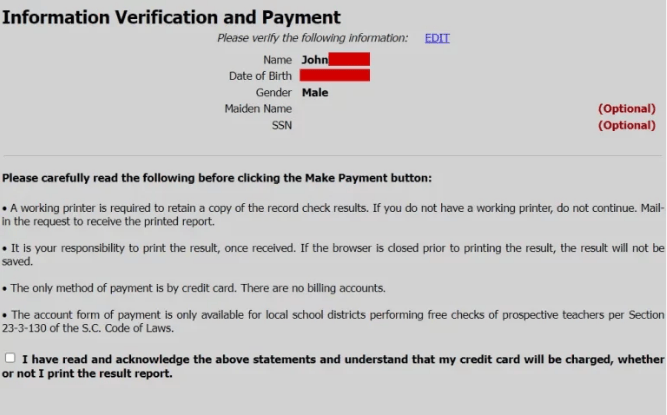
To obtain your arrest record, you have several options available. Regardless of the method you select, please note there is a non-refundable fee of $25.00. You can make your request online or by mailing a Criminal Records Check Form along with a self-addressed stamped envelope to the address below:
SLED Records Department
Postal Box 21398
Columbia, SC 29221
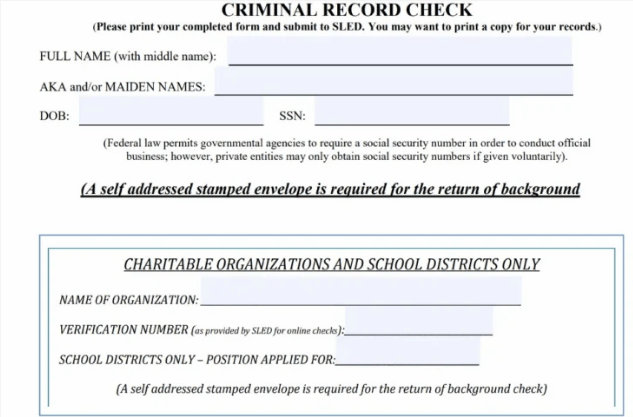
When seeking arrest records from SLED, you need the individual’s exact birth date and name. Otherwise, you may pay a fee without receiving the records.
At the county level, contact the courthouse or law enforcement agency for their specific process to obtain arrest records.
State and local regulations govern the request for another person’s arrest records. Professional requests require legal consent, whether for employment screening or tenant background checks in South Carolina.
Clearing Your Arrest Record in SC
In South Carolina, expunging your record means the court orders the complete removal of specific offenses or arrests from your criminal record. This is known officially as an Order for Destruction of Arrest Records. Here are key points to know about expunging your arrest record in South Carolina:
- Apply for expungement in the county where the South Carolina arrest occurred.
- Different timeframes apply depending on the case disposition; immediate application is possible for dismissals, non-prosecutions, or similar outcomes.
- Expungement is a process that can take up to 6 months to complete.
- For convictions, a minimum administrative fee of $250 is required. Additional fees may apply based on the offense type.
- Violent crime convictions and certain traffic violations are not eligible for expungement.
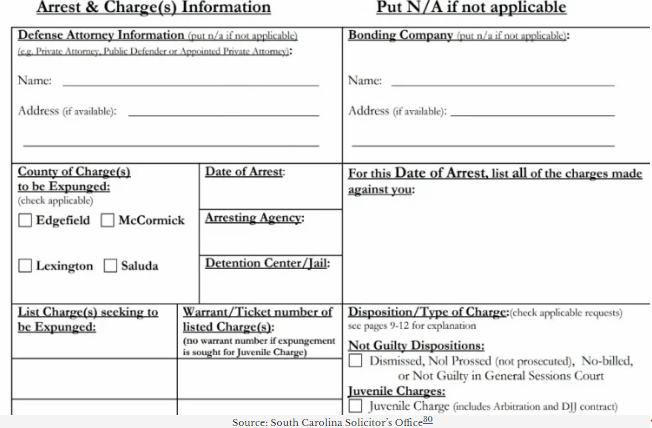
Navigating South Carolina Arrest Record Laws
In South Carolina, you have the right to access arrest records under state and federal laws. Although some records may be exempt, most are readily available.
It’s important to follow rules governing the use of these records. Using them to commit crimes or for coercion is prohibited.
Background checks for employment have specific regulations under the EEOC and FCRA, ensuring fair use.
If you’re concerned about your records, expungement may be an option, offering a fresh start and limiting access by future employers.
To find South Carolina arrest records, use county jail or sheriff’s inmate lookup tools, or contact them directly if tools aren’t available.
For criminal records, utilize county court case search tools from the judicial branch or South Carolina’s Department of Corrections offender search.
Frequently Asked Questions
Our FAQ section offers extensive information covering safety concerns related to Arrests.org SC. It includes frequently asked questions accompanied by detailed explanations to help you effectively address safety issues.
How can I access arrest records in South Carolina?
Arrest records in South Carolina are generally public information. You can try searching the website of the arresting agency (local police department or sheriff’s office) or the South Carolina Court Administration [SC Court Administration (.gov)]. However, some records may be sealed or expunged, restricting access.
What information do arrest records typically contain?
Arrest records often include the arrestee’s name, date of arrest, charges filed, booking information, and sometimes the arresting officer’s name. It’s important to note that an arrest doesn’t equal guilt, and the record may not reflect the final outcome of the case.
Are South Carolina arrest records public information?
Yes, South Carolina arrest records are considered public information and can be accessed by anyone under the Freedom of Information Act (FOIA). This allows individuals, employers, and organizations to obtain records for various purposes, including background checks and legal proceedings.
Can arrest records in South Carolina be expunged?
Yes, under certain circumstances, arrest records in South Carolina can be expunged, meaning they are sealed or erased from public record. Eligibility for expungement varies based on factors such as the type of offense, whether charges were dropped or dismissed, and the individual’s criminal history.
How accurate are South Carolina arrest records?
South Carolina arrest records are generally accurate but may occasionally contain errors or incomplete information. It’s essential to verify information obtained from these records through additional sources, such as court records or direct inquiries with the arresting agency, to ensure accuracy and completeness.
Are there any fees associated with accessing arrest records?
Fees for accessing arrest records can differ based on the agency and the method used for the search. Some agencies or websites may charge a nominal fee for providing access to these records, while others might offer them for free. It’s essential to check with the specific source to understand any potential costs involved.
